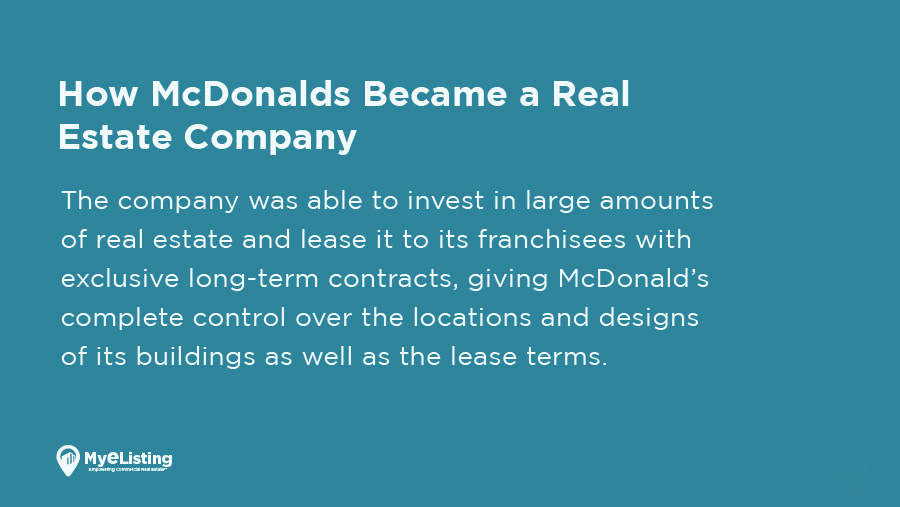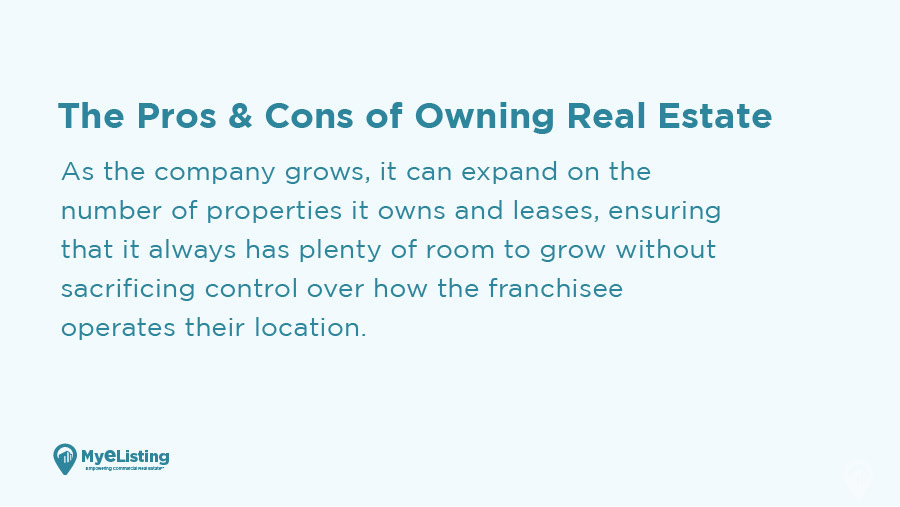How McDonald's Became One of the Largest Real Estate Companies in the World

Specializes in providing actionable insights into the commercial real estate space for investors, brokers, lessors, and lessees. He covers quarterly market data reports, investment strategies, how-to guides, and top-down perspectives on market movements.

Most people see McDonald's as a fast-food chain with great food and reasonable prices. But this staple of American culture is actually more than that: It's one of the world's largest real estate companies.
The fast-food chain owns nearly twice as many properties as its competitors or any business of a similar nature. Instead of leasing retail space out from other property owners, the company purchases its own units, then leases them out to its franchisees, who find the opportunity attractive thanks to the plentiful awareness around McDonald's brand name.
Let's take a look at how McDonald's went from a small family-owned operation to a billion-dollar company.

A Brief History of McDonald's
Mac and Richard McDonald opened the first McDonald's restaurant in San Bernardino, California, in 1940. The restaurant first operated as a drive-in with a large menu, but it wasn't yet known for its fast service.
In 1948, the brothers re-envisioned the business to produce large amounts of food quickly and cheaply. At the time, they called it the “Speedee Service System,” only selling hamburgers, potato chips, pie, and drinks. They replaced their drive-in with a self-service counter to save on labor costs.
In 1954, appliance salesman Ray Kroc visited McDonald's to see why the brothers needed so much equipment. Soon after, he became a franchise agent for McDonald's and launched what is known today as the McDonald's Corporation. After growing tired of the brothers' rules and regulations surrounding their franchising, Ray Kroc bought McDonald's from the brothers in 1961.
Ray Kroc grew McDonald's into a franchise with specific standards for quality that ensured that customers received the same item no matter which franchise they visited. To do this, he launched a training program called Hamburger University, a program that aimed to keep McDonald's quality the same around the world.
How McDonald's Became a Real Estate Company

McDonald's was founded as a franchise, meaning each McDonald's restaurant was owned and operated by an independent contractor who could make their own decisions about the business. This model proved successful but meant that McDonald's had no control over the locations, the design of buildings, or the length of the lease.
This was problematic, as McDonald's was unable to control its own growth, and lease terms were often unfavorable, making it difficult to expand. A number of attempts were made to create partnerships with real estate developers to build on their own properties.
These attempts were often unsuccessful, as developers wanted the flexibility to lease to other companies. This led McDonald's to shift to a different approach: becoming a real estate company.
The company was able to invest in large amounts of real estate and lease it to its franchisees with exclusive long-term contracts, giving McDonald's complete control over the locations and designs of its buildings as well as the lease terms.
This not only ensured long-term growth for both the company and the franchisees but also universally enforced McDonald's quality standards no matter the location: If a franchisee were to go rogue, McDonald's could simply cut their lease and repossess the property.
The Pros of Owning Real Estate

Owning real estate is often looked at as a long-term investment with long-term profit. Whereas a restaurant's revenue only lasts as long as it can stay in business, real estate has the potential to generate income for decades.
Tenants of your real estate investment can come and go, and barring any natural disasters that destroy your property, your investment is likely to continue producing revenue for you so long as it's occupied.
Ray Kroc understood this when he transformed McDonald's into a real estate business: While a restaurant's revenue may fluctuate depending on the local economy and consumer spending, the real estate income stays steady so long as a majority of your units are occupied. Owning real estate is also a scalable investment and one of the ways that McDonald's is able to make so much money.
As the company grows, it can expand on the number of properties it owns and leases, ensuring that it always has plenty of room to grow without sacrificing control over how the franchisee operates their location.
This contrasts with restaurant owners who lease their space out from real estate owners, as the growth of their business can be hampered by the owner's lease terms.
McDonald's as One of the Biggest Real Estate Companies
McDonald's is one of the biggest real estate companies in the world. It owns or leases more than 38,000 restaurants in over 100 countries and has a portfolio worth an estimated $30 billion. The company's golden arches are one of the most recognizable logos in the world, and its franchisees operate under fixed rates set by McDonald's.
The company has been criticized for its environmental impact, labor practices, and unhealthy food. However, it has also been praised for how its economic success and franchise model made it one of the most valuable brands in the world.
McDonald's Real Estate Process

When opening a new location, McDonald's will first find an ideal property to buy. This is then leased to the company at a rate equal to the market rate of interest, as well as a rental fee. The real estate is then leased to the franchise owner, who pays rent based on a percentage of their sales.
The franchisee can control the lease terms and grant themselves more room for profitable expansion. McDonald's, on the other hand, can keep a close eye on all of the franchises, ensuring that its brand and standards are applied across all locations.
This is a win-win situation for McDonald's in a couple of ways: It can have a direct hand in the success of the franchisee, leading to higher revenue based on increased sales, and it also gives the company a lot of leverage over its franchisees.
If, for example, a franchise consistently underperforms and refuses to adapt to corporate quality control changes, McDonald's can revoke that franchisee's lease.
If this happens, the franchisee must vacate the location. With the ability to essentially shut them down, McDonald's has few problems with getting the franchisee to do what the company wants.
List & Browse Commercial Real Estate for Free on MyEListing.com!
Inspired by Ray Kroc's success? You can list and browse commercial real estate for free right here on MyEListing.com.
Simply sign up for a free account and get unlimited access to accurate local market intelligence, customized property type alerts, comp software, and more.
Article Search
Share
All Article Categories








